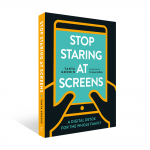
06 Sep How to help your teen, and you, log off
Everyone with teenagers has witnessed the close relationship they have with their digital devices. Often, as a parent it can feel like a constant battle to separate your child from their screens.
Now it appears that teens themselves are becoming more aware of their overuse of devices. New research from America reveals that 54 per cent of teens (13 to 17-year-olds) feel they spend too much time on their phone, but when asked the same question only 36 per cent of their parents felt they needed to cut down on screen time!
This month sees the launch of Stop Staring At Screens written by Time to Log Off’s founder Tanya Goodin. In her new book, Tanya outlines ways you can help you and your teen to both log-off and find some digital balance. Here are four of Tanya’s top tips.
# Lead by example
So many of our worries about screen overuse seem focused on our children, teenagers in particular. Yet how many important family conversations and moments are we missing out on as parents because we’re looking at our smartphone, tablet, or laptop? We expect our teenagers to cut down on their screen use but don’t do it ourselves!
Remember as parents our children model our behavior. We lead by example, if we don’t want them to look at their mobile during a meal then we shouldn’t either. Agree on a set of screen rules for everyone, and remember everyone in the house needs to follow the rules. No exceptions (that means you too).
# Out of sight
Another good rule of thumb is that when talking to a teenager at home put your phone away, completely out of sight, and fully focus on them. This way you and your teenager will both feel engaged and present when you chat.
You could create a tech box in the kitchen where mobile phones are stored, or suggest that everyone leaves their phone on the hall table when they come home. This rule should cut down on mindless scrolling of the internet and social media for you and your teenager creating more free time to do things together like bake, go for a walk, do an exercise class or watch an old movie.
# Screen curfew
It’s a fact, the blue light that shines from screen devices disrupts our sleep. And no-one likes dealing with a grumpy, tired teen who’s had a bad night because they’ve been on their smart phone until the early hours. Or perhaps you’re just as guilty and watch Netflix on your mini-screen late into the night?
Either way, a screen curfew would benefit you both. Why not agree a house curfew for a time in the evening when all digital devices are switched off? Get everyone in the family relearning screen-free alternatives for relaxing in the evening such as reading a book or having a hot, non-caffeinated drink. It’s guaranteed, you will all sleep more a lot more soundly. And better sleep means less arguments.
# Stop the noise
Even if you have a rule at home that devices should be put away when everyone is together, the sound of gadgets pinging or vibrating can be very hard to ignore. Start by suggesting you turn off all sounds when you’re together as family. Even better, why not turn off your screens altogether?
If this rule sounds too radical start small, have one total screen free night a week as a family, say Friday night, and build it up gradually. Soon, you and your children will feel it’s more normal not to be constantly reaching for your phone. And less noise in your home will also give you and your children a host of added health benefits including better sleep, reduced stress and improved memory.

* Stop Staring At Screens by Tanya Goodin (ILEX, £9.99) is out now.




Sorry, the comment form is closed at this time.